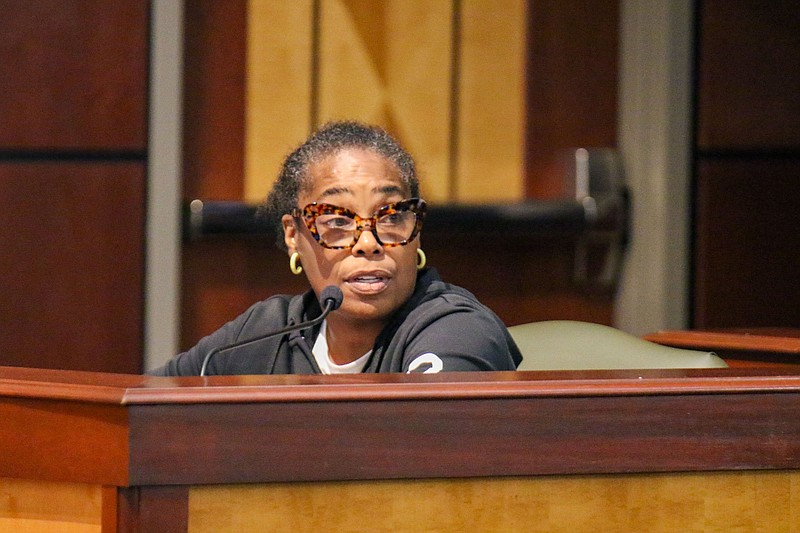On the day after the Chattanooga City Council failed to second Councilwoman Demetrus Coonrod's proposal to discuss term limits and move the date for city elections, the Tennessee House State Government Committee passed a joint resolution calling for states to propose a congressional term limits amendment to the U.S. Constitution.
In other words, the joint resolution is still in the discussion stage in the state legislature, but our city council didn't even want to debate the issue.
To be clear, term limits aren't anywhere in the state's near future even if the joint resolution passes the full House and Senate, and they wouldn't have been had Coonrod gotten a second on her proposal. But if the polls that say congressional term limits are something nearly 80% of Tennesseans want, aren't their general merits -- or lack thereof -- worth debating?
We have said in the past that we're not in favor of term limits for city council members and moving the city election day to coincide with the county general election, but we'd like to hear those issues debated among all nine members of the body and the general public. We might be persuadable.
Coonrod has said she originally proposed the changes to draw more voters to the polls. Hamilton County Election Commission records show only 24.9% of voters bothered to cast a ballot in the March 2021 city election, with one district drawing only about 20% of eligible voters. Election commission officials also say it would save the city money on election costs.
Her term limits proposal would have limited council members to four four-year terms and extended a mayor to serve as many as four four-year terms (from the two a mayor can currently serve).
Had the councilwoman's proposal have gotten a second, it would have had to be discussed and then passed by the council on two different readings. And then it would have to go to the voters for an up or down vote in a 2025 referendum.
In Nashville, the House committee didn't even need a roll-call vote to move the resolution forward. It now goes before the full House next week.
Were both the House and the Senate to pass the measure (HJR5), and 33 other states to pass similar resolutions, the sponsoring U.S. Term Limits organization would file an application to hold a convention to establish a term limits proposal for Congress. Congress, in turn, would have to pass the constitutional amendment measure, and then 38 states would have to ratify it.
So it's a long way off, if it should ever happen. And what those term limits are would be up to the convention.
Term limits have been proposed for Congress as far back as 1789, according to a legislative history in a Senate report filed by U.S. Sen. Fred Thompson, R-Tennessee, in 1995.
In recent years, a 1945 Senate resolution proposed limits of six years for presidents, vice presidents and members of Congress. The first Senate vote on term limits came on 1947, when it was proposed that Congress be limited to the two terms (eight years) then being suggested for presidents (which later passed as a constitutional amendment). However, the congressional term limits proposal lost, 82-1.
Proposed 1978 resolutions would have limited senators to two terms and House members to either six or seven terms. A 1991 amendment to a campaign finance reform bill that would limit the use of public funds by members of Congress who serve more than 12 years was tabled by a 68-30 vote. A proposal to do the same thing in 1993 was tabled on a 57-39 count.
A late 1990s Supreme Court decision said states could not determine congressional term limits, but that left the door open for a constitutional amendment, which is what the U.S. Term Limits organization is pushing in the 50 states.
Legislatures in Alabama, Florida, Missouri and West Virginia passed resolutions in previous years seeking a national term limits convention, and the Wisconsin legislature passed such a resolution this year. Other resolutions, in addition to Tennessee, have been introduced in the Arizona, Georgia, Kentucky, Montana, New Hampshire, North Carolina (where it already has passed the House), Oklahoma, Pennsylvania and South Carolina legislatures.
U.S. Term Limits officials say more than 60 Tennessee legislators -- including state Reps. Patsy Hazlewood, R-Signal Mountain, and Greg Vital, R-Georgetown -- already have pledged to support the congressional term limits resolution.
An RMG Research survey indicates such term limits are supported in Tennessee by 90% of Democrats, 77% of Republicans and 71% of independents.
We wholeheartedly support a state resolution that would lead to a national convention on congressional term limits. Wherever one stands on them, a national conversation is better than the silence Coonrod got earlier this week when she suggested her fellow council members at least discuss the issue on a local basis.
